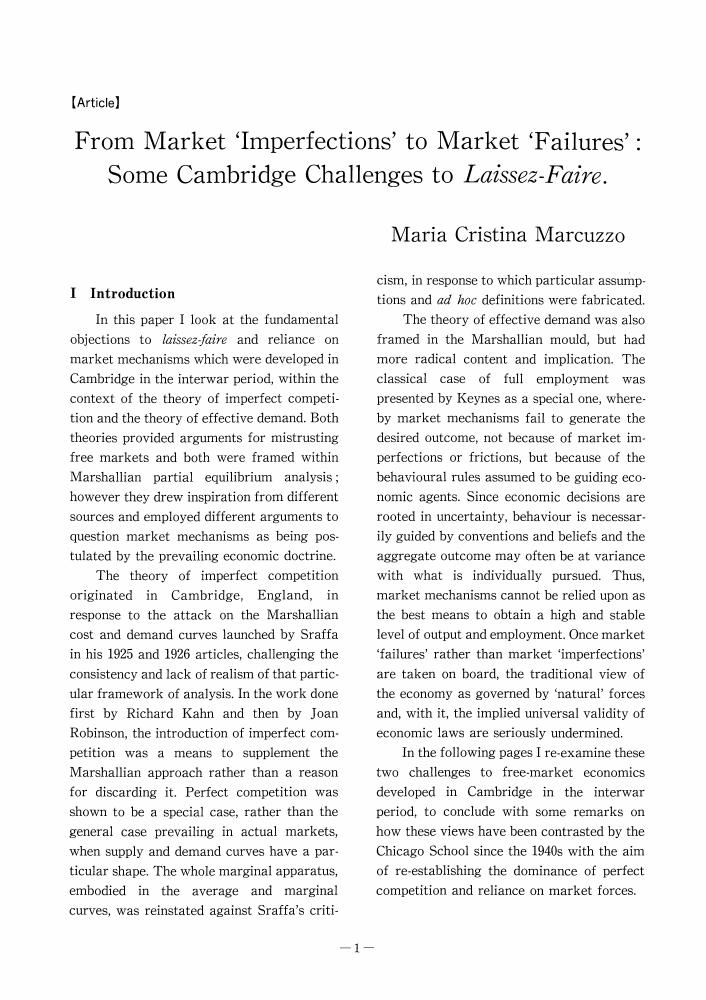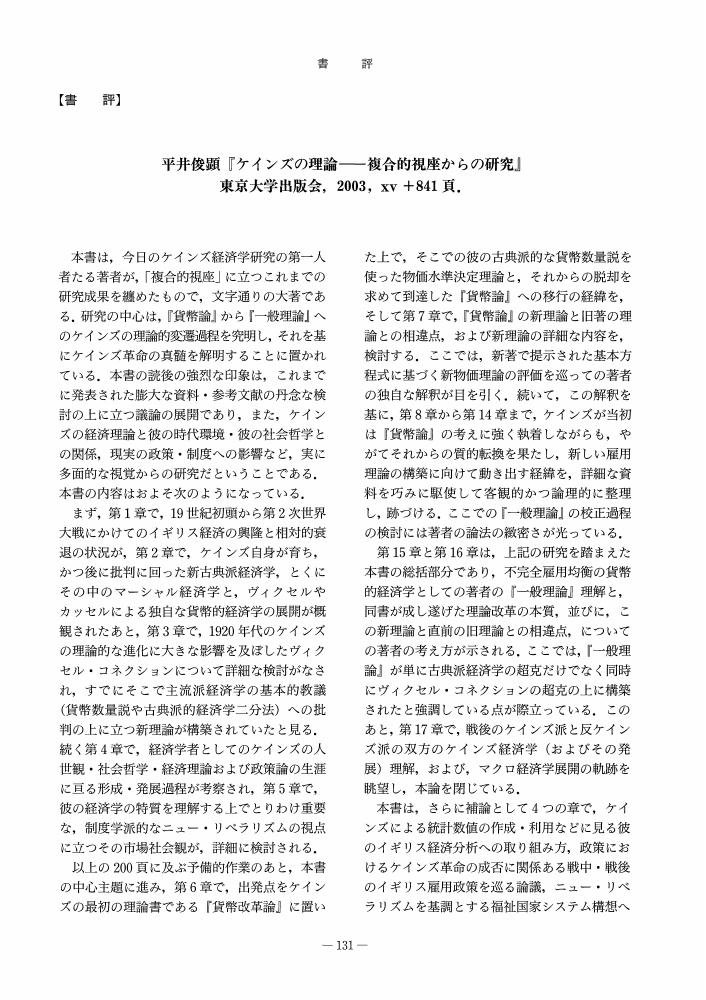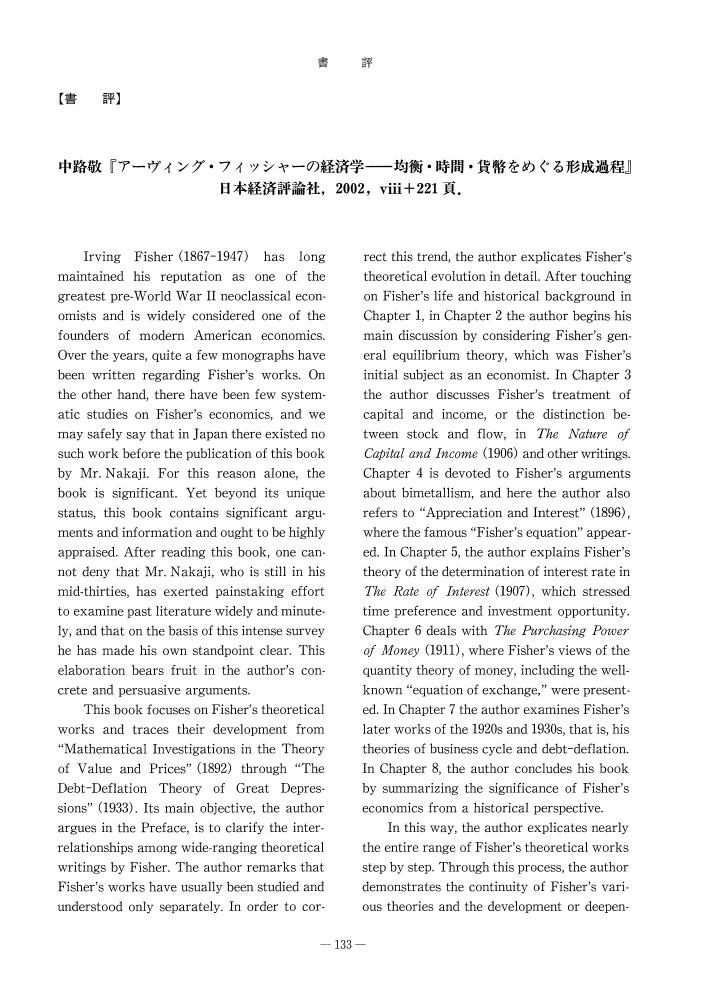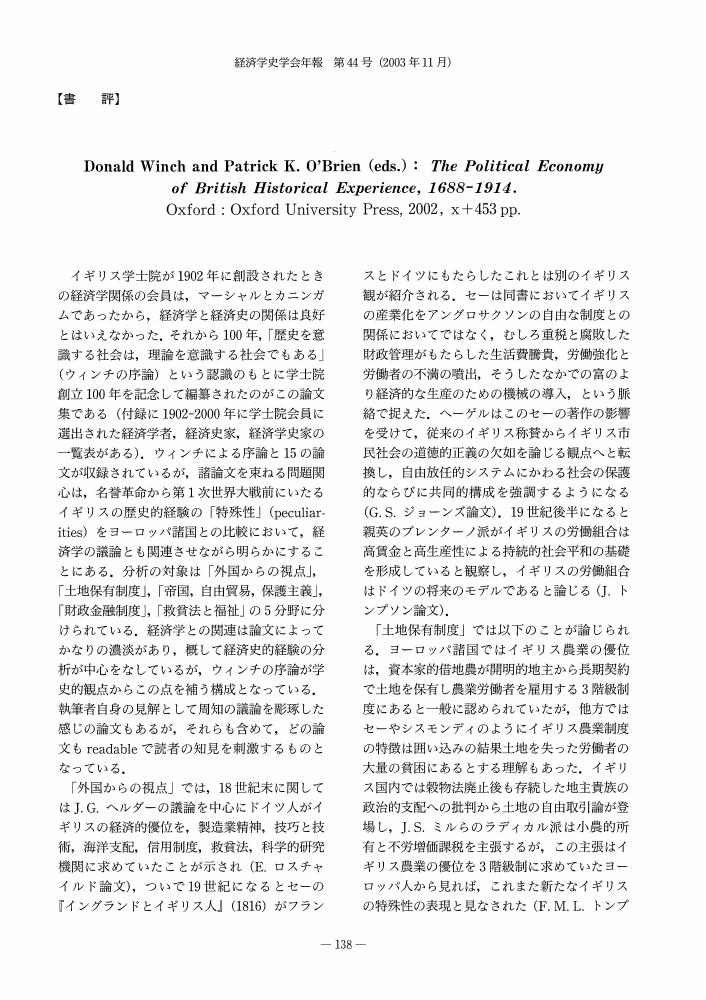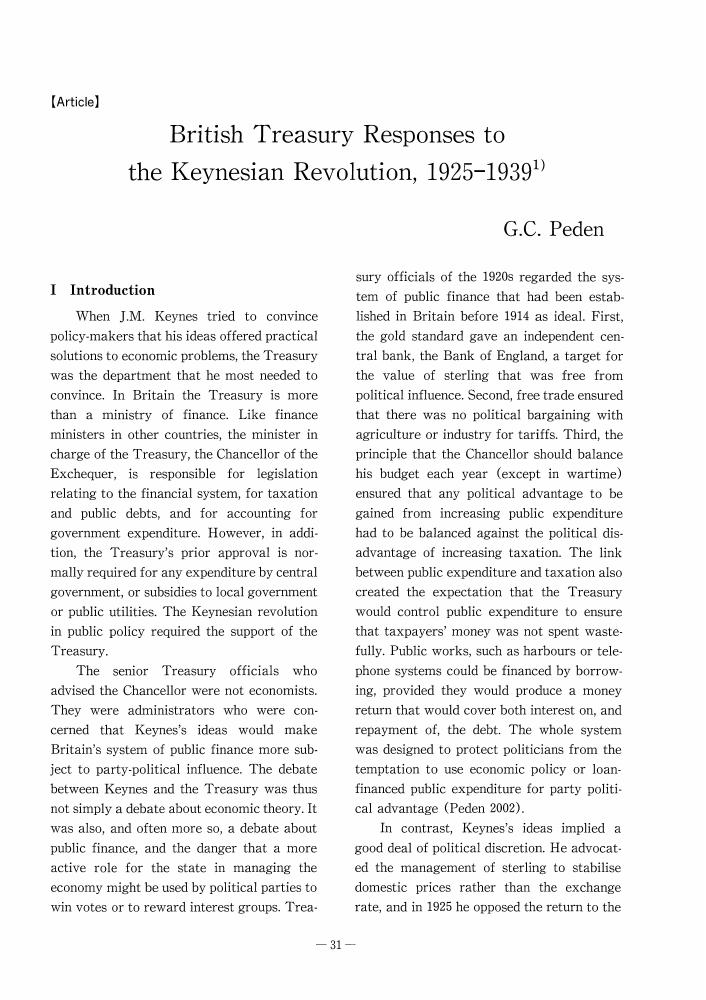- 著者
- 松本 有一
- 出版者
- The Japanese Society for the History of Economic Thought
- 雑誌
- 経済学史学会年報 (ISSN:04534786)
- 巻号頁・発行日
- vol.44, no.44, pp.146-147, 2003 (Released:2010-08-05)
- 著者
- Susumu Egashira
- 出版者
- The Japanese Society for the History of Economic Thought
- 雑誌
- 経済学史学会年報 (ISSN:04534786)
- 巻号頁・発行日
- vol.44, no.44, pp.148-150, 2003 (Released:2010-08-05)
- 著者
- 久保 真
- 出版者
- The Japanese Society for the History of Economic Thought
- 雑誌
- 経済学史学会年報 (ISSN:04534786)
- 巻号頁・発行日
- vol.44, no.44, pp.151-153, 2003 (Released:2010-08-05)
- 著者
- 川俣 雅弘
- 出版者
- The Japanese Society for the History of Economic Thought
- 雑誌
- 経済学史学会年報 (ISSN:04534786)
- 巻号頁・発行日
- vol.44, no.44, pp.154-155, 2003 (Released:2010-08-05)
1 0 0 0 OA From Market ‘Imperfections’ to Market ‘Failures’: Some Cambridge Challenges to Laissez-Faire
- 著者
- Maria Cristina Marcuzzo
- 出版者
- The Japanese Society for the History of Economic Thought
- 雑誌
- 経済学史学会年報 (ISSN:04534786)
- 巻号頁・発行日
- vol.45, no.45, pp.1-10, 2004 (Released:2010-08-05)
- 参考文献数
- 40
- 著者
- Yoshihiko Hakamata
- 出版者
- The Japanese Society for the History of Economic Thought
- 雑誌
- 経済学史学会年報 (ISSN:04534786)
- 巻号頁・発行日
- vol.45, no.45, pp.11-25, 2004 (Released:2010-08-05)
- 参考文献数
- 23
1 0 0 0 OA ハイエクに対するシュパンの影響
- 著者
- 江頭 進 塘 茂樹
- 出版者
- The Japanese Society for the History of Economic Thought
- 雑誌
- 経済学史学会年報 (ISSN:04534786)
- 巻号頁・発行日
- vol.45, no.45, pp.26-39, 2004 (Released:2010-08-05)
- 参考文献数
- 44
This paper deals with the influence of Othmar Spann, a Viennese professor of economics and sociology during the interwar period, on the development of Hayek's ideas. Spann was an examiner of Hayek when he obtained his Ph. D. in Political Science, and Hayek was a regular member of the Spann circle. Moreover, there is, at least on the surface, a similarity between Hayek's core theory of the Spontaneous Order developed mainly after the 1960s and Spann's Universalism.Hayek avoided mentioning Spann after the 1930s. However, in this article, we propose the hypothesis that Hayek never forgot Spann's arguments yet always maintained some distance from him. Hayek developed the theory of Spontaneous Order as an idea based on methodological individualism from the 1940s to the 1960s. However, some recent studies have pointed out the conflict between methodological individualism and holism in The Fatal Conceit (1988). Moreover, it is pointed out that his argument in later years has a holistic or institutional character compared with Friedman or Rothbard because he develops his assertion on the basis of the theory of Spontaneous Order. If we can accept this and the fact that our society largely depends on spontaneous order, there is a possibility that the problem of totalitarianism still remains. In this sense, the relationship between Hayek and Spann is one of the current issues in political economy.Hayek was always cautious about the confusion between his arguments and the assertion of conservatism, and we can say the same thing about Hayek and Spann's arguments. This fact suggests that analysis of the similarity and difference between the arguments of Hayek, which are one of the most important streams of modern liberalism, and those of Spann, is important from the viewpoint not only of the historical studies of social science but also in modern political science.In this article, we consider this hypothesis in three stages. First, we outline Spann's Universalism and Hayek's conception of the individualism. Second, we consider the influence of Spann on Hayek's doctoral dissertation. His dissertation deals with the Imputation Theory and the first half discusses the problem proposed by Spann. Third, we analyse the structural similarity between the arguments of Hayek after the 1970s and those of Spann. This similarity can be clarified in the light of evolutionism and relativeness.
1 0 0 0 OA 新村氏の書評に答える
- 著者
- 星野 彰男
- 出版者
- 経済学史学会
- 雑誌
- 経済学史学会年報 (ISSN:04534786)
- 巻号頁・発行日
- vol.44, no.44, pp.121-122, 2003 (Released:2010-08-05)
- 著者
- 山崎 怜
- 出版者
- 経済学史学会
- 雑誌
- 経済学史学会年報 (ISSN:04534786)
- 巻号頁・発行日
- vol.44, no.44, pp.123-127, 2003 (Released:2010-08-05)
- 著者
- 山崎 耕一
- 出版者
- 経済学史学会
- 雑誌
- 経済学史学会年報 (ISSN:04534786)
- 巻号頁・発行日
- vol.44, no.44, pp.128-130, 2003 (Released:2010-08-05)
- 著者
- 浅野 栄一
- 出版者
- 経済学史学会
- 雑誌
- 経済学史学会年報 (ISSN:04534786)
- 巻号頁・発行日
- vol.44, no.44, pp.131-132, 2003 (Released:2010-08-05)
- 著者
- Motohiro Okada
- 出版者
- 経済学史学会
- 雑誌
- 経済学史学会年報 (ISSN:04534786)
- 巻号頁・発行日
- vol.44, no.44, pp.133-134, 2003 (Released:2010-08-05)
- 著者
- 中村 宗悦
- 出版者
- 経済学史学会
- 雑誌
- 経済学史学会年報 (ISSN:04534786)
- 巻号頁・発行日
- vol.44, no.44, pp.135-137, 2003 (Released:2010-08-05)
- 著者
- 熊谷 次郎
- 出版者
- The Japanese Society for the History of Economic Thought
- 雑誌
- 経済学史学会年報 (ISSN:04534786)
- 巻号頁・発行日
- vol.44, no.44, pp.138-140, 2003 (Released:2010-08-05)
1 0 0 0 OA Tiziano Raffaelli: Marshall's Evolutionary Economics. London: Routledge, 2003, Xiii+178pp.
- 著者
- 近藤 真司
- 出版者
- The Japanese Society for the History of Economic Thought
- 雑誌
- 経済学史学会年報 (ISSN:04534786)
- 巻号頁・発行日
- vol.44, no.44, pp.141-142, 2003 (Released:2010-08-05)
- 著者
- 姫野 順一
- 出版者
- The Japanese Society for the History of Economic Thought
- 雑誌
- 経済学史学会年報 (ISSN:04534786)
- 巻号頁・発行日
- vol.44, no.44, pp.143-145, 2003 (Released:2010-08-05)
- 著者
- Tetsuo Taka
- 出版者
- The Japanese Society for the History of Economic Thought
- 雑誌
- 経済学史学会年報 (ISSN:04534786)
- 巻号頁・発行日
- vol.44, no.44, pp.17-30, 2003 (Released:2010-08-05)
- 参考文献数
- 40
- 著者
- G. C. Peden
- 出版者
- The Japanese Society for the History of Economic Thought
- 雑誌
- 経済学史学会年報 (ISSN:04534786)
- 巻号頁・発行日
- vol.44, no.44, pp.31-44, 2003 (Released:2010-08-05)
- 参考文献数
- 27
1 0 0 0 OA ヘンリー・クレイにおける産業, 組織, 協業
- 著者
- 若森 みどり
- 出版者
- The Japanese Society for the History of Economic Thought
- 雑誌
- 経済学史学会年報 (ISSN:04534786)
- 巻号頁・発行日
- vol.44, no.44, pp.45-58, 2003 (Released:2010-08-05)
- 参考文献数
- 18
Henry Clay [1883-1954] was known as a strong advocate of “rationalisation” in the decade of the 1920s. In 1933 he was appointed to an economic adviser of Montague Norman who was the governor of the Bank of England. The purpose of this paper is to examine Clay's ideas regarding the industry, economic organisation, and co-operation that evolved in the period from 1916 to 1929.Clay lectured on economics for the Worker's Educational Association between 1909 and 1917, and published a book entitled Economics: an Introduction for the General Reader [1916]. Clay's intention was to explain the social arrangements which make the business transaction “possible.” For Clay, economics should be the study of business in its social aspect; it is the object of economics to explain such arrangements in detail and to show how the system works, and economists should study what points of contact the economic order has with the political order, and how far the economic order harmonies with the moral order. Criticizing “a survival from the period of orthodox laissez faire, ” Clay suggested that the object of economics was not the advocacy of the present economic system. Focusing on specialisation and the production system's dependence on anticipated demand, Clay treated difficulties such as severe fluctuations, over-production, and the unemployment that accompanied them as “imperfections of co-operation.” Clay closely evaluated the social role of businessmen in organizing and co-ordinating industry both efficiently and morally, because they prevented those difficulties. In addition, Clay insisted that the economic organisation in the past had been moralized by the action of the State quite as much as through the economic actions of individuals; a few examples would be the reform of the early factories, the abolition of infant labour in mines, the regulation of dangerous trades, and the prevention of deleterious adulteration, all of which had needed the intervention of the State.After the First World War, the economic conditions and circumstances dramatically changed. Clay came to consider that the most urgent problem was how to reconstruct the British industry. Immediately following the war, Clay insisted on the need for the imperative leadership of government to reset an industrial order for peace (Clay 1918). However, the government did not take such measures. So Clay blamed the difficulties of the post-war unemployment problem and those of depressed industries on the mismanagement of the government including the return to the gold standard (Clay 1929a, 1929b). The greater comparative depression of the export industries was one of the most striking features of the post-war period. In late 1920s, Clay suggested “rationalisation”: the regeneration of private enterprise or the amalgamation of small businesses by banks. Clay regarded the banks to have the ability to reorganize finance and give strategic knowledge to firms, both of which were necessary for efficient management.
1 0 0 0 OA J. S. ミルにおける認識論と宗教の関係
- 著者
- 船木 恵子
- 出版者
- The Japanese Society for the History of Economic Thought
- 雑誌
- 経済学史学会年報 (ISSN:04534786)
- 巻号頁・発行日
- vol.44, no.44, pp.59-74, 2003 (Released:2010-08-05)
- 参考文献数
- 29
The purpose of this paper is to examine the religious descriptions of J. S. Mill in relation to his epistemology. As far as religion was concerned, Mill, as is well known, was not educated in a theistic atmosphere. His attitude to christianity may be open to some serious questioning. Mill maintained empiricist positions throughout his life. Many empiricists adopted an agnostic position. Of course Mill approved of agnosticism and attempted to reject the “Argument for a First Cause” as having no basis in experience. This paper discloses Mill's epistemological attitude and the new interpretation of “Religion of Humanity” that differ from recent studies. One of the recent trends of Mill studies is to focus on his “Religion of Humanity” and to show its resemblance to that of Auguste Comte. However, this interpretation ignores the fact that Mill was critical to the latter day argument of Comte. In contrast, this paper deals the religious writing of Mill with the careful examination of his discussion of epistemology.Section one of this paper presents recent studies of Mill's religious thought. As previously noted, Mill's religious descriptions are combined with his epistemology. This paper states that the only reseach of Three Essays on Religion is imperfect, and in order to grasp exactly Mill's religious thought, we have to deal with his wide works, and study from an all-around view. However, Mill's conventional religious studies were concentrated in his Three Essays on Religion. Recently, however, original research of Mill has focused on “Religion of Humanity.” Such studies include those of Humberger and Raeder. Section one states that their studies are novel but inadequate regarding their treatment of Comte.Section two of this paper delves into Mill's religious directions. This section is composed of two segments. The first segment shows that Mill's religious directions are of three types. The second segment describes Mill's particular Argument of Design.Section three of this paper provides a close discussion of two famous intuitionists of the nineteenth century, William Whewell and Sir William Hamilton. Mill made pointed remarks about Whewell and Hamilton's intuitionism. The propose of this section is to explain why Mill attacked intuitionism.Section four constitutes the core of this paper. This section considers Mill's “Religion of Humanity” and Inverse Deductive, or Historical Method, which he treated in the sixth volume of A System of Logic. From the standpoint of human nature, Mill tries to rewrite the “Doctrine of Necessity.” Mill had to accept a distance between a social phenomenon and his epistemology. Mill states human actions are never uncontrollable, and in order to show this idea, Mill suggests the Historical Method.Thus, when we trace Mill's religious descriptions, we discover Mill's particular-epistemological thought relating to human will. The relationship of Mill's “Religion of Humanity” and the Historical Method lead tothe conclusion that Mill's religious background has an epistemological dimension.




